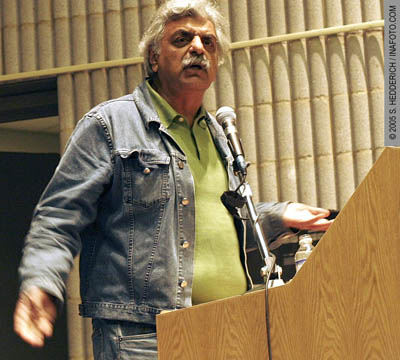
This week, Tony Blair launched a scathing ideological attack on Islamism. Describing the conflict between Islamism and the world as a, "battle for modernity," he quoted the conservative American historian, Samuel Huntington, in order to refute him. Contrasting his interpretation of a "conflict about civilisation" in a historical chiaroscuro with Huntington's "conflict of civilisations," Blair blasted Islamism as the fountainhead of the world's escalating level of ultra-violence.
Promising to make further keynote speeches to address the Israel-Palestine conflict in the Middle East, Blair sought to defend the pointed attacks on Islamic fundamentalism by George Bush and Christopher Hitchens as the raison d'etre for the war in Iraq. In his latest lamentation on the exclusively Islamic sources of ulta-violence, terrorism and war, Blair echoed the mantras of the coterie of deeply Islamophobic neoconservative intellectuals who emerged from the right-wing witches' cauldron of Leo Stein at the University of Chicago.
Blair's diatribe was the performance of a committed idealist, a demagogue mesmerized by his own ideology and not that of an intellectual, an academic, a mainstream politician or a statesman. Blair inhabits that shadowy region of Christianity that sees itself as totally separate and apart from the other faiths stemming from the house of Abraham: Judaism and Islam. In Blair's vision of Christianity, there are no Muslims who accept the messianic status of Jesus; no Christians who launch terrorist atrocities and no Jewish terrorists, either.
In the mind of Tony Blair, the trouble with world terror stems exclusively from the ideology and culture of Islamic fundamentalism. In Blair's deeply bipolar world, Christianity and Judaism are blameless for the rising tide of terror.
In Blair's definition of terror, the lynchings of the Christian Knights of the Ku Klux Klan, the terror bombings of Oklahoma, the brutal beatings of Muslims in Britain, the extra-judicial killings of Palestinians, the Christian bombings of pharmaceutical factories in Sudan and the Israeli military assassinations of Palestinians simply do not exist.
His selective vision of the world is troubling for it emanates from a double standard. Fundamentalist Christian terror does not exist for Blair. Fundamentalist Judaic terror does not exist for Blair. Whether Blair is capable of discerning fundamentalist Hindu terror is--at this point in time--unknown.
The question arises: Is Tony Blair Islamophobic? Islamophobia has emerged as the anti-Semitism of the twenty-first century. Blair recently gave an interview in which he revealed his inordinate commitment to Christianity. Explaining his decision to wage war on Iraq, Blair said that his religious beliefs had shaped his decision to join forces with Bush's neoconservative juggernaut.
Much has been made of Blair's personal religious idiosyncrasy. Married to a traditional Roman Catholic, Blair's solemn devotion to religious orthodoxy has been exposed to the microscope of public scrutiny. In 2004, a Roman Catholic priest was foolish enough to give a press conference stating Blair's personal desire to convert to the Church of Rome. Reliable witnesses have confirmed that Blair and Bush pray together during their wartime summits. The extremist religious ideology of Bush is well-established. His political partnership with Blair is founded on much more than the special relationship between Britain and America. These two men share a common faith in the fundamental veracity of some of the most orthodox and conservative attitudes in Christendom and apparently some of the most extreme ones, as well.
Their's is a partnership that not only prays, but also preys together.
Praying together, Bush and Blair consistently prey on their common enemy - the Islamic culture that has fostered what in their myopic vision is pure "evil"--i.e. terror.
Their common myopia places the bombings launched by Christian fundamentalists, the assassinations committed by Jewish fundamentalists and the religious motivation of the tractor-driving assassin who fractured the skull, severed the spine and crushed the life out of Rachel Corrie outside of their narrowing cone of perception.
Their condition is simply a twin case of visual, optical and intellectual bipolarity. In their world: Islam is evil. Christianity is good. Judaism is invisible. But, does this intellectual bipolarity make Blair Islamophobic? Is he, in fact, as bipolar in his reaction to Islam as the anti-Semitic bigots of the last century?
To date, let it be noted that Blair has not called out in public for the genocidal extermination of the entire Islamic population of the world. Let it also be noted that Adolf Hitler did not publicise his plan for the final solution to what he perceived as the problem posed by the Jews he hated and feared. Hitler's tirades against the Jews led to the public acceptance of anti-Semitism. Will Blair's frontal assault on Islamists lead Britain in the same direction?
We keenly await Blair's future pronouncements on Israel and Palestine.
Michael Carmichael has been a professional public affairs consultant, author and broadcaster since 1968. In 2003, he founded The Planetary Movement Limited, a global public affairs organization based in the United Kingdom. He has appeared as a public affairs expert on the BBC's Today Programme, Hardtalk, PM, as well as numerous appearances on ITN, NPR and many European broadcasts examining politics and culture. He can be reached through his website: www.planetarymovement.org


















